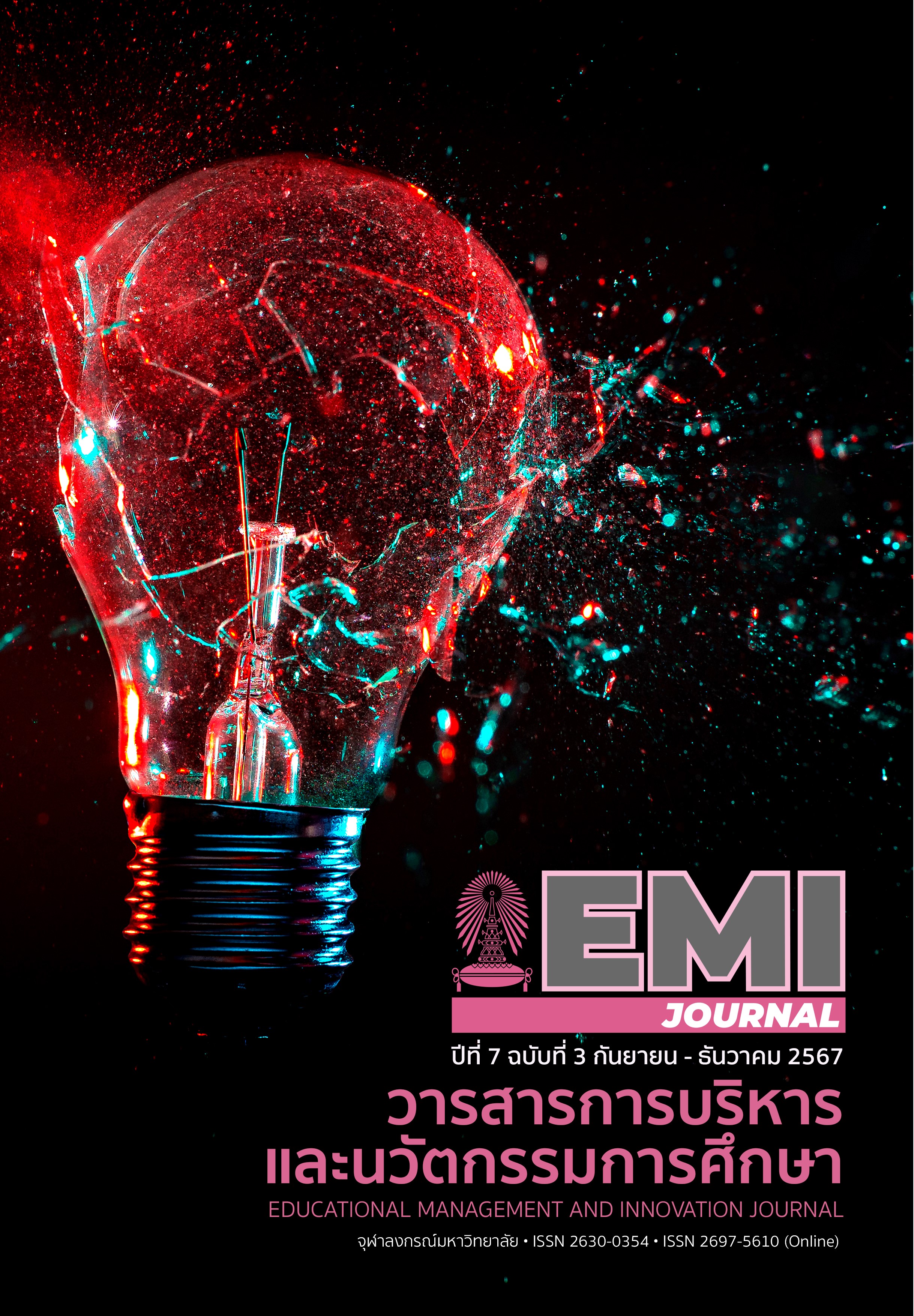A Factor Analysis of Digital Competency to Promote Learning Management for Private School Administrators
การวิเคราะห์องค์ประกอบสมรรถนะดิจิทัลเพื่อส่งเสริมการจัดการเรียนรู้สำหรับผู้บริหารโรงเรียนเอกชน
คำสำคัญ:
สมรรถนะดิจิทัล ผู้บริหารโรงเรียน การวิเคราะห์องค์ประกอบเชิงยืนยัน การจัดการเรียนรู้บทคัดย่อ
การวิจัยนี้มีวัตถุประสงค์เพื่อวิเคราะห์องค์ประกอบเชิงยืนยันสมรรถนะดิจิทัลเพื่อส่งเสริมการจัดการเรียนรู้ สำหรับผู้บริหารโรงเรียนเอกชน เครื่องมือที่ใช้ในการวิจัย คือ แบบสอบถามแบบมาตราส่วนประมาณค่า 5 ระดับ มีค่าดัชนีความสอดคล้องอยู่ในช่วง 0.60-1.00 และค่าความเชื่อมั่นเท่ากับ 0.97 ทำการศึกษาจากกลุ่มตัวอย่างผู้บริหารโรงเรียนเอกชนจำนวน 500 คน ที่ได้มาโดยการสุ่มแบบหลายขั้นตอน สถิติที่ใช้ในการวิเคราะห์ข้อมูล ได้แก่ ค่าเฉลี่ย ส่วนเบี่ยงเบนมาตรฐาน ค่าสัมประสิทธิ์สหสัมพันธ์ และการวิเคราะห์องค์ประกอบเชิงยืนยัน
ผลการวิจัยพบว่า สมรรถนะดิจิทัลเพื่อส่งเสริมการจัดการเรียนรู้สำหรับผู้บริหารโรงเรียนเอกชนประกอบด้วย 11 องค์ประกอบ 60 ตัวบ่งชี้ ได้แก่ 1) การพัฒนาทางวิชาชีพ (6 ตัวบ่งชี้) 2) วิสัยทัศน์ (8 ตัวบ่งชี้) 3) การรู้ดิจิทัล (6 ตัวบ่งชี้) 4) ความร่วมมือ (5 ตัวบ่งชี้) 5) การสื่อสาร (5 ตัวบ่งชี้) 6) การสร้างสรรค์ (6 ตัวบ่งชี้) 7) การแก้ปัญหา (5 ตัวบ่งชี้) 8) การจัดการทรัพยากร (5 ตัวบ่งชี้) 9) การสร้างบรรยากาศการทำงาน (4 ตัวบ่งชี้) 10) การจัดการข้อมูล (5 ตัวบ่งชี้) และ
11) การเสริมพลังบุคลากร (5 ตัวบ่งชี้) มีความสอดคล้องกลมกลืนกับข้อมูลเชิงประจักษ์โดยพิจารณาจากค่าสถิติ ดังนี้ ค่าสถิติไค-สแควร์สัมพัทธ์ (X2/df) = 1.9606 CFI = 0.939, TLI = 0.933, SRMR = 0.038, RMSEA = 0.044 แต่ละองค์ประกอบมีค่าน้ำหนักองค์ประกอบมาตรฐานอยู่ในช่วง 0.837-0.921 อย่างมีนัยสำคัญทางสถิติที่ระดับ .01
Downloads
เอกสารอ้างอิง
Ala-Mutka, K. (2011). Mapping digital competence: Towards a conceptual understanding. Publications Office of the European Union.
Bashir, S. (2020). Digital skills: Frameworks and programs. Washington, D.C.: World Bank.
Buachu, T. (2019). The Status of digital leadership of education management administrators. Journal of Educational Studies, 13(2), 285-294. [In Thai]
Chaemchoy, S. (2019). School management in digital era. Bangkok: Chulalongkorn University Press.
[In Thai]
Comrey, A. L., & Lee, H. B. (1992). A first course in factor analysis. Hillsdale, New Jersey: Erlbaum.
CoSN. (2018). Framework of essential skills of the K-12 CTO. Retrieved from https://www.cosn.org/ careers-certification/framework-of-essential-skills/
Damrongpanit, S. (2012). Mplus program for data analysis of behavioural and social sciences. Mahasarakham: Mahasarakham University Printing House. [In Thai]
Davies, A., Fidler, D., & Gorbis. D. (2011). Future work skills 2020. Palo Alto, CA: Institute for the Future for University of Phoenix Research Institute.
Dexter, s. (2008). Leadership for IT in schools in Voogt, J., & Knezedk, G. (Eds.). International Handbook of Information Technology in Primary and Secondary Education, Springer. New York, 543-554.
Gardner, H. (2007). Five minds for the future. Boston: Harvard Business School Press
Imran, F., Shahzad, K., Butt, A., & Kantola, J. (2020). Leadership competencies for digital transformation: Evidence from multiple cases. Advances in Human Factors, Business Management and Leadership, July, 2020, 81-87.
ISTE. (2009). ISTE standards: Education leaders. Retrieved from https://www.iste.org/standards/iste-standards-for-education-leaders
Janssen, J., Stoyanov, S., Ferrari, A., Punie, Y., Pannekeet, K., & Sloep P. (2013). Experts’ views on digital competence: commonalities and differences. COMPUTERS and EDUCATION 68 (October 2013); 2013. pp. 473-481.
Keesookpun, E. (2016). School management in digital era. Retrieved from https://www.trueplookpanya. com/education/content/52232 [In Thai]
Khantong, N., & Boobpha, S. (2021). Digital skills of school administrators affecting work motivation of teachers under Nongkhai secondary educational service area office. Journal of Modern Learning Development, 6(4), 148-163. [In Thai]
Klus, F. M., & Muller, J. (2020). Identifying leadership skills required in the digital Age. CESifo Working Paper Series 8180, CESifo.
Ministry of Education. (2564). Digital transformation for education action plan 2020-2022. Bangkok: Bureau of Information and Communication Technology.
Minister of Education and Higher Education, Quebec Canada. (2019). Digital competency framework. Retrieved from https://www.education.gouv.qc.ca/
North Carolina Department of Public Instruction. (2019). NC Digital learning competencies for school administrators. Retrieved from https://www.dpi.nc.gov/
OCSC. (2009). Digital skills of civil and government personnel for digital government transformation. Retrieved from www.ocsc.go.th
OECD. (2018). The Future of education and skills: Education 2030. Retrieved from https://www.oecd.org /education/2030-project/
Office of the Education Council. (2017). The national scheme of education B.E. 2560-2579. Bangkok: Prikwran Graphic. [in Thai]
Office of the Education Council. (2021). Research report on guidelines for promoting learning linked to the national digital learning platform in Thailand. Bangkok: Prikwran Graphic. [In Thai]
ONDE. (2019). Digital competence framework for Thai citizens. Retrieved from https://www.onde.go.th/
PDST Technology in Education. (2017). Digital learning framework for primary school. Retrieved from https://www.pdsttechnologyineducation.ie/
Raksanakorn et al. (2020). Needs assessment for development of primary school administrators’ attributes in 21st century. World Journal of Education, 10(2), 158-162.
Redecker, C. (2017). European framework for the digital competence of educators: DigCompEdu. Retrieved from https://joint-research-centre.ec.europa.eu/digcompedu_en
Sheninger, E. (2014). 7 Pillars of digital leadership. International Center for Leadership in Education. Retrieved from https://leadered.com/pillars-of-digital-leadership/
Supising et al. (2021). School management paradigm in digital disruption era. Interdisciplinary Research Review, 16(2), 19-25.
ดาวน์โหลด
เผยแพร่แล้ว
ฉบับ
ประเภทบทความ
สัญญาอนุญาต
ลิขสิทธิ์ (c) 2024 วารสารการบริหารและนวัตกรรมการศึกษา

อนุญาตภายใต้เงื่อนไข Creative Commons Attribution-NonCommercial-NoDerivatives 4.0 International License.



